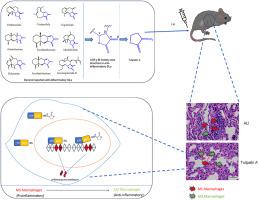郁金香苷 A 通过干扰 NF-κB 的 DNA 结合活性,抑制了 M1 巨噬细胞的促炎极化,减轻了小鼠的急性肺损伤。
IF 4.2
3区 医学
Q1 PHARMACOLOGY & PHARMACY
引用次数: 0
摘要
急性肺损伤(ALI)是一种伴有较高发病率和死亡率的炎症性疾病。据报道,ALI 的病理机制与巨噬细胞释放炎症细胞因子有关。倍半萜内酯(SL)是许多天然产品的主要抗炎成分。郁金香苷 A 是一种天然小分子,也是抗炎 SLs 中的一个保守分子。然而,郁金香苷 A 的抗炎潜力尚未被完全揭示。本研究旨在研究郁金香苷 A 在体外和体内的抗炎活性及其内在机制。郁金香苷 A 能抑制脂多糖(LPS)刺激的骨髓原代巨噬细胞的炎症反应,并能改善 LPS 诱导的小鼠 ALI。从机理上讲,郁金香苷 A 直接靶向 NF-κB p65,破坏其 DNA 结合活性,从而阻碍 NF-κB 的活化。抑制 NF-κB 可减轻巨噬细胞的 M1 极化,从而抑制促炎介质的产生,改善 ALI 的发生和发展。这些研究结果表明,郁金香苷 A 有可能通过靶向 NF-κB p65 并破坏其 DNA 结合活性来缓解 ALI 等炎症性疾病。本文章由计算机程序翻译,如有差异,请以英文原文为准。

Tulipalin A suppressed the pro-inflammatory polarization of M1 macrophage and mitigated the acute lung injury in mice via interference DNA binding activity of NF-κB
Acute lung injury (ALI) is an inflammatory disorder accompanied by higher morbidity and mortality. The pathological mechanism of ALI has been reported to be associated with the release of inflammatory cytokines by macrophages. Sesquiterpene lactones (SLs) represent the principal anti-inflammatory components of many natural products. Tulipalin A is a natural small molecule and a conserved moiety in anti-inflammatory SLs. However, the anti-inflammatory potential of Tulipalin A has yet to be fully disclosed. The present study aims to investigate TulipalinA's anti-inflammatory activity and underlying mechanisms in vitro and in vivo. Tulipalin A suppressed inflammatory responses in lipopolysaccharide (LPS)-stimulated bone marrow-derived primary macrophages and ameliorated LPS-induced ALI in mice. Mechanistically, Tulipalin A directly targets the NF-κB p65 and disrupts its DNA binding activity, thereby impeding the activation of NF-κB. Inhibition of NF-κB attenuated M1 polarization of macrophages, consequently suppressing the production of pro-inflammatory mediators and ameliorating the onset and progression of ALI. These findings suggest Tulipalin A's potential to mitigate inflammatory disorders like ALI via targeting NF-κB p65 and disrupting its DNA binding activity.
求助全文
通过发布文献求助,成功后即可免费获取论文全文。
去求助
来源期刊
CiteScore
9.00
自引率
0.00%
发文量
572
审稿时长
34 days
期刊介绍:
The European Journal of Pharmacology publishes research papers covering all aspects of experimental pharmacology with focus on the mechanism of action of structurally identified compounds affecting biological systems.
The scope includes:
Behavioural pharmacology
Neuropharmacology and analgesia
Cardiovascular pharmacology
Pulmonary, gastrointestinal and urogenital pharmacology
Endocrine pharmacology
Immunopharmacology and inflammation
Molecular and cellular pharmacology
Regenerative pharmacology
Biologicals and biotherapeutics
Translational pharmacology
Nutriceutical pharmacology.

 求助内容:
求助内容: 应助结果提醒方式:
应助结果提醒方式:


